After being sued twice, MCoBeauty has become a multi-million-dollar empire built on beauty dupes
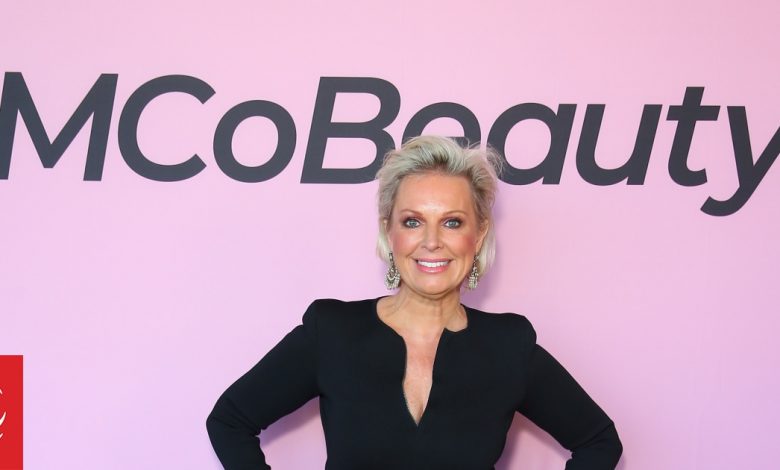
Exclusive by ABC business reporters Kate Ainsworth and Emilia Terzon, The Business
MCoBeauty has become a multi-million-dollar cosmetics empire, but its path to success hasn’t been without controversy due to its strategy of copying, or “duping”, popular beauty products.
The Australian cosmetics company is the brainchild of Sydney entrepreneur Shelley Sullivan. After years running a modelling and talent agency, Sullivan pivoted into beauty by launching ModelCo in 2002.
Fast forward to 2016, and Sullivan launched MCoBeauty, which has made a name for itself by openly pushing legal boundaries to duplicate trending, higher-end cosmetics, selling them at major retail outlets for a much lower price.
“This brand is all about luxe for less and providing quality products at a luxe for less price,” she told ABC’s The Business.
“Duping is what we call a pillar of our marketing strategy, and definitely not at the top of our funnel of how we market.”
Duping is by no means a new practice in the beauty industry, and nor is MCoBeauty the only company that provides “dupes” of popular products – but the brand showed how far it was willing to go when it created its own version of a viral product by UK makeup brand Charlotte Tilbury.
“I’d say that’s probably the main product that’s gone, what I would say, close to the line when it comes to packaging,” Sullivan acknowledged.
On occasions the company appears to have crossed the line. MCoBeauty was sued twice for trademark infringement in 2021 and ended up rebranding its own products as a result.
MCoBeauty insists the practice is perfectly legal, and its copycat cosmetics strategy has been immensely successful.
The business is projected to reach A$250 million in sales this year, which is roughly 5 percent of Australia’s A$5 billion beauty industry, and it was recently partially acquired by Australian pharmaceutical giant Arrotex.
Now MCoBeauty is expanding overseas, with its products sold in almost 2000 Kroger stores across the highly lucrative, but also highly litigious, US market.
‘They’re not being shy about it’
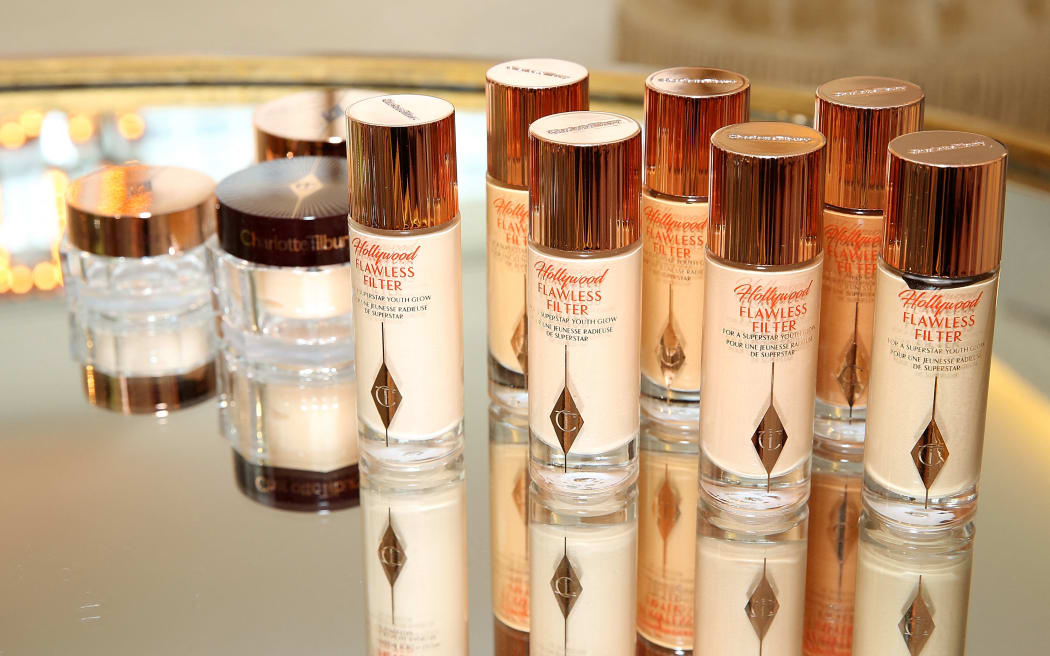
MCoBeauty’s first products went on sale in Woolworths stores and online in 2018 and, as the company expanded, so too did rumblings about its “dupes”.
But it wasn’t until April 2023, when MCoBeauty launched its divisive alternative to Charlotte Tilbury’s product, that the brand caught the attention of the beauty world.
The cult product is described as a “complexion booster” that gives a radiant, smooth glow to the skin, inspired by Hollywood lights and social media filters.
Melbourne-based makeup artist and creator Claire Bridgett, who is a paid ambassador for rival cosmetics giant L’Oreal, remembers the hype and debate about MCoBeauty’s dupe of the British-brand’s Hollywood Flawless Filter.
Not only did MCoBeauty’s version of it use the word “flawless”, but it also had the same golden lid, circular bottle and even a similar wand to apply the product. It was also half the price at $35.
“Personally, I was surprised because I work in the industry, and I was like ‘whoa, they’ve gone there, they’re not being shy about it’,” Bridgett told The Business.
“I think a lot of people had that initial reaction.”
Bridgett, who has been vocal about her concerns around MCoBeauty’s duping strategy, compared the products in a video she shared to TikTok that went “absolutely viral”.
“Every single comment was like, ‘Who is their lawyer, how are they getting away with this?’,” she recalled.
“It was pretty wild.”
A flawless free-for-all
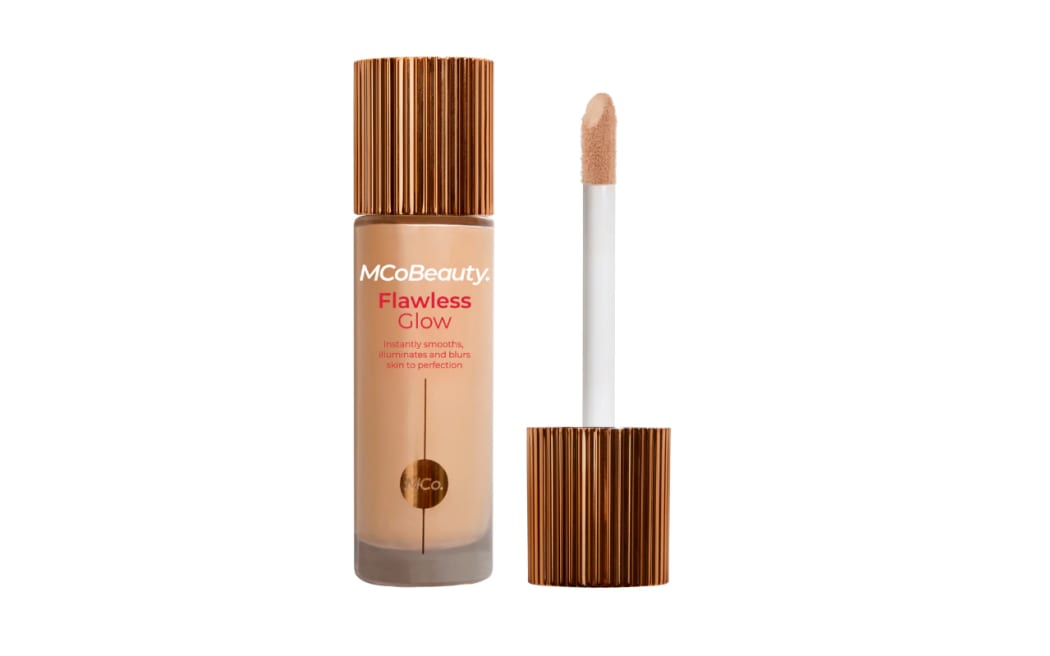
The reason MCoBeauty was able to replicate the Charlotte Tilbury product so closely is thanks to its patent and trademarks lawyer Len Mancini.
In his first-ever interview, Mancini wasn’t shy about discussing the Charlotte Tilbury dupe.
“I’ve seen that packaging once or twice,” Len Mancini laughed.
He explained that what can and cannot be replicated in the world of “beauty dupes” all comes down to protected brand assets – if it does not infringe on Charlotte Tilbury’s trademarks, then MCoBeauty can legally dupe it.
The example he gave first is MCoBeauty’s spin on Charlotte Tilbury’s three-word brand name “Hollywood Flawless Filter”, which it has changed to “MCoBeauty Flawless Glow”.
“Let’s start with the word flawless. Charlotte Tilbury does not own the rights to the word ‘flawless’,” Mancini told The Business.
“Charlotte Tilbury, from recollection, has a trademark for the phrase ‘Hollywood Flawless Filter’, but using the word ‘flawless’ is not an infringement on that trademark.”
Mancini said there was one particular asset that was different when comparing the products side-by-side, which MCoBeauty had to change in its product development process.
“That diamond is actually a protected asset. But look, there is no diamond here,” he said.
“There’s no trademark infringement happening in this.”
That legal advice is precisely how MCoBeauty was able to dupe the product so accurately, the company’s founder and chief executive Shelley Sullivan said.
“It was such a hugely requested product, so we looked at the formulation, we looked at the packaging, we looked at the logo,” she told The Business.
“In fact, we trademarked the name of the product, and also the symbols, because the company that we took that product off hadn’t trademarked certain elements of their product.”
Charlotte Tilbury has previously successfully sued the British arm of discount supermarket chain Aldi for copying its products, however the company declined to comment on MCoBeauty specifically when contacted by the ABC.
“We know that competitors often try, but fail, to copy our iconic products,” a Charlotte Tilbury spokesperson said in a statement.
Even with thorough legal checks, Sullivan knows that her company pushed the limits – and intentionally so – when duping the Charlotte Tilbury product, and maintains that the company did not cross the line legally.
However, knowing how far to push the legal boundaries is a lesson MCoBeauty had to learn the hard way.
The first lawsuit
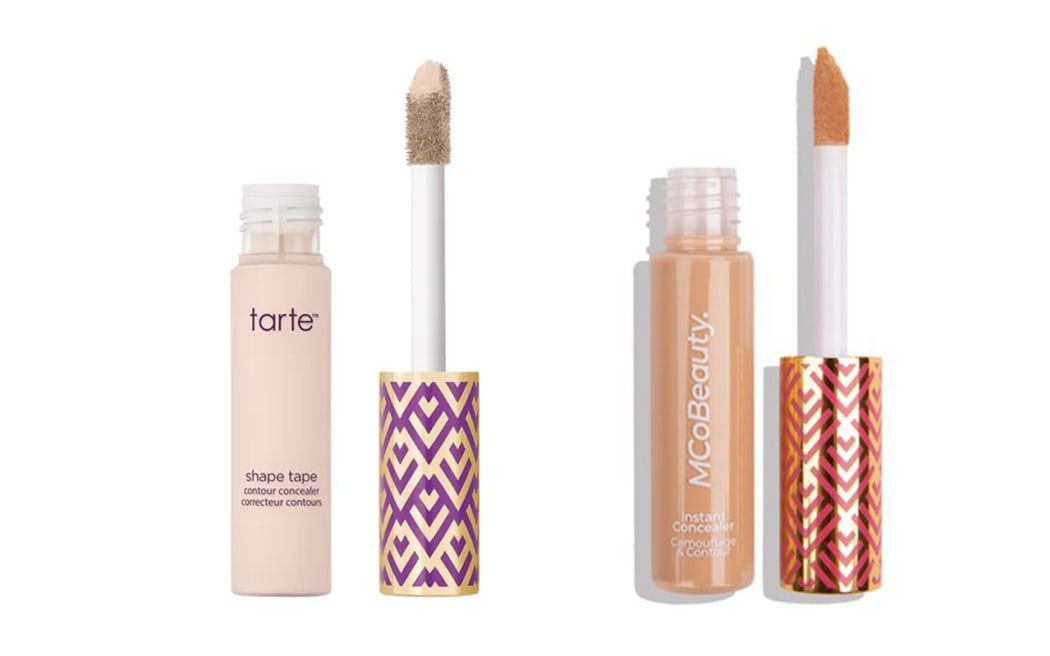
American cosmetics brand Tarte was the first to sue MCoBeauty in 2021, alleging the company had attempted to deceive customers by using a specific pattern on a reflective gold lid.
Specifically, Tarte alleged that MCoBeauty had copied its “Shape Tape” concealer packaging, which had a chevron pattern on the concealer lid.
In court documents accessed by the ABC, Tarte alleged the packaging on the concealer MCoBeauty had released earlier that year was too similar to its own, and claimed it was “misleading and deceptive conduct”, in breach of Australian Consumer Law.
The allegation by Tarte was especially serious, as it was claiming the product was bordering on a counterfeit item and could confuse shoppers.
Trademark and patent expert from the University of Western Sydney Dr Sarah Hook said if that claim had made it to a full court hearing, the judge would have literally had to compare packaging.
“There’s this wonderful test called the wonderment test,” Dr Hook told The Business.
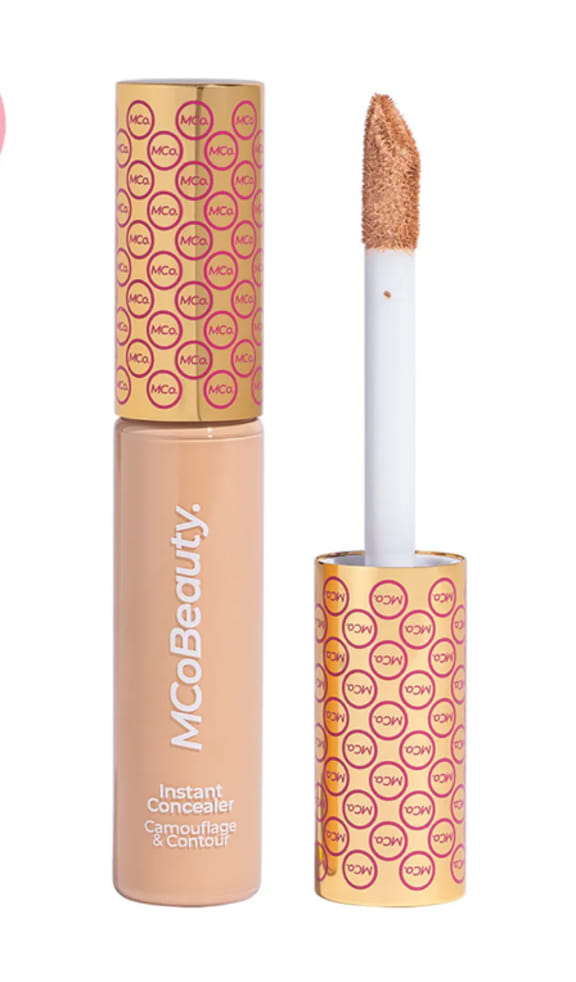
“And this test is if a consumer is walking down the shopping aisle, and they wonder if that product is a brand that they know, then it’s too substantially similar, or it is going to confuse the public and they might accidentally buy it, thinking it’s from a different brand or a different origin.”
Dr Hook said this is a very high bar to prove when brands lodge cases, especially because there is generally no confusion from a customer that they are buying a high-end brand when they are shopping at Woolworths or Chemist Warehouse.
This was the crux of MCoBeauty’s defence in the Tarte case, stating that the products were packaged differently and sold in different retailers and were therefore unlikely to cause confusion for customers.
Both parties agreed to settle the case on confidential terms in September 2021, with MCoBeauty later replacing the chevron lid design with a pattern of its circular logo.
“We changed that quick smart,” Sullivan said.
Tarte, which has a major presence in the US market where MCoBeauty is now expanding, told the ABC that it will “continue to vigorously defend its rights to all Tarte trademarks and designs”.
“Many counterfeit and dupe products use similar packaging and do not guarantee the same sulfate, paraben, phthalate, petrolatum, triclosan or formaldehyde free formulations,” a Tarte spokesperson said.
“These counterfeits and dupes could pose a potential risk to consumers who believe they are purchasing products similar to Tarte.”
A homegrown beauty battle
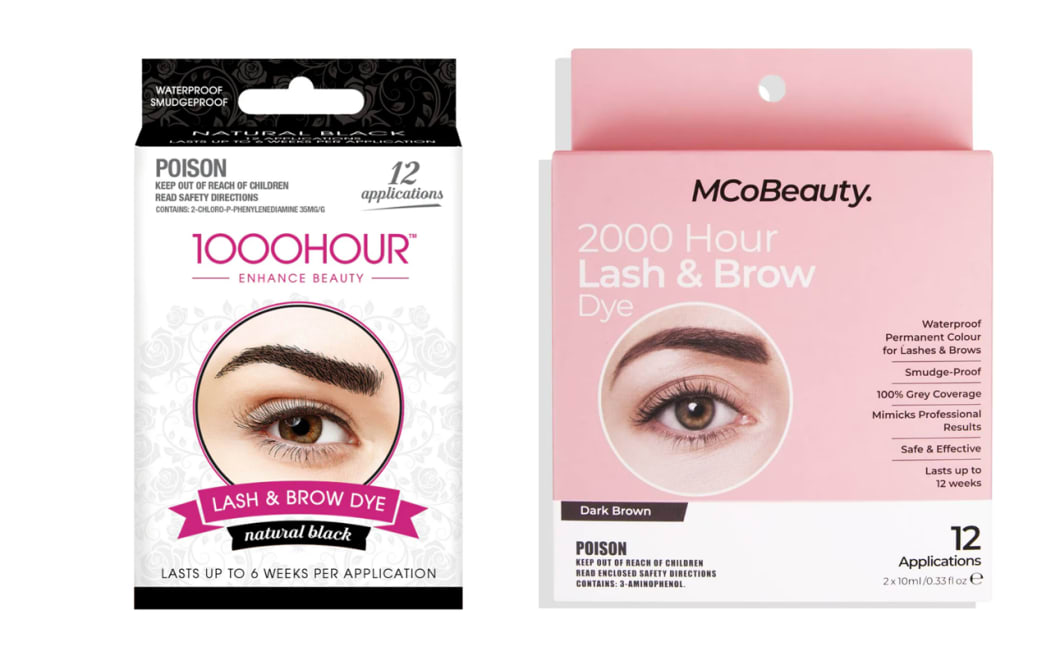
That same year, MCoBeauty was sued again – this time by an Australian family-owned business, Chemcorp.
The Sydney-based company has been selling a range of eyebrow and eyelash products under its 1000Hour brand for decades.
The trademarked brand’s name is prominently displayed on its boxes and is a nod to the time it takes for an eyelash to grow and fall out, promising therefore that its lash and brow dyes will last.
Court documents obtained by the ABC allege MCoBeauty started selling its own lash and brow dye kit in 2021, under the name 2000Hours.
As part of its case, Chemcorp argued the product was “substantially identical and/or deceptively similar” to its trademarks, and infringed on its copyright.
MCoBeauty denied the allegations, and argued its product was not misleading customers due to being “prominently branded”, therefore not breaching section 29 of the Australian Consumer Law.
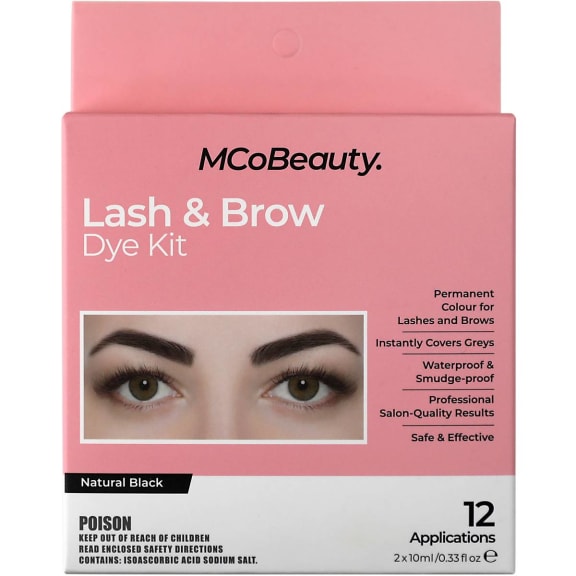
“[The 2000Hours branding] was simply a case of [MCoBeauty] not knowing it was being used as a trademark, and thinking that it was just descriptive terminology,” Mancini said.
Both parties agreed to settle the case out of court – again on confidential terms – and MCoBeauty rebranded the product and changed its packaging.
MCoBeauty’s founder Sullivan said the company decided not to bother fighting the Chemcorp case because 2000Hour was not selling well.
“In fact, we still have 20,000 units in our warehouse,” she said.
“We didn’t want to fight. It wasn’t a great product.”
For Chemcorp managing director Jodie Phillips the case was about more than lost sales or confusing customers – she said it was a matter of principle, with her father creating the 1000Hour brand.
“Our decision to address the issue of a competitor creating what we considered an unlawful copy, as opposed to a dupe product, and engaging in misleading conduct was never driven by a fear of competition, but about maintaining the standards of the industry as a whole,” she said.
“The importance of protecting intellectual property and a brand we had built over some 30 years in market, and calling out unfair and illegal trade practices, cannot be overstated.”
To this day, Phillips maintains MCoBeauty crossed a line “both ethically and legally”.
Sullivan defended MCoBeauty’s ethical judgement, while the company’s lawyer Len Mancini said it wasn’t his job to consider that part of the equation.
“My job is to keep things legal,” he said.
Could more legal action be on the horizon?
Legal expert Dr Hook said cases like the ones lodged in 2021 against MCoBeauty are relatively rare, and it is even more unusual for them to succeed in court, such as the case that Charlotte Tilbury won against Aldi in the UK.
“Beauty dupes have been around forever, and we don’t see cases every day, every week, every month,” Dr Hook said.
“I think most companies do know where those lines are, and they much more rely on influencers and social media to say what they are a substitute for, rather than trying to copy or trying to pretend that they’re something that they are not.
“I think [what the MCoBeauty cases show is] perhaps beauty companies in the race to get products on the shelves, are not thinking through or perhaps not getting proper legal advice or listening to legal advice.”
As MCoBeauty expands into the US market, Dr Hook has a warning for the Australian brand.
“They [Americans] are much more litigious. They also have trade dress, which is like our designs’ patent,” Dr Hook said.
“The idea of passing off as another brand is definitely something that is litigated a lot over in America. The bigger brands over there have more money. They’re not as concerned about the smaller Australian market.”
Already, MCoBeauty has caught the attention of beauty influencers in the world’s biggest beauty market, with content creators and their followers asking the same question as Claire Bridgett’s: How are they not getting sued?
MCoBeauty has a team of lawyers in the US, and Sullivan insists they are not worried.
“For the products that people will kind of deem as a dupe, they’ve all been cleared [by lawyers] before they go to sell,” she said.
The business of being transparent
The multi-million-dollar cosmetics company now has more than 500 products, and Sullivan said many of them are not classified by MCoBeauty as “hardcore dupes” like the Charlotte Tilbury one.
Instead, there’s “take of” products, such as MCoBeauty’s lower price version of a blush by the French luxury label Dior. While it has a similar silver box and embossing on the pressed powder, there is no mirror, in an effort to keep costs down for customers.
There are also products that MCoBeauty claims as original, including its popular mascara, XtendLash. Sullivan alleges the product is now being duped by another major retailer, but declined to name names.
Regardless, she has no problem with others duping MCoBeauty, and also had a message for others entering the beauty duping space.
“Go for it,” Sullivan said.
“We’re in the business of being completely transparent with our customers.
“Obviously it’s drawn a lot of attention, because people want to save money.”
Watch the full story on The Business tonight at 8:45pm AEST on ABC News Channel, or stream on ABC iview.
– ABC
According to the news on Radio New Zealand




